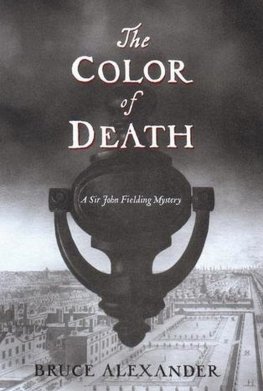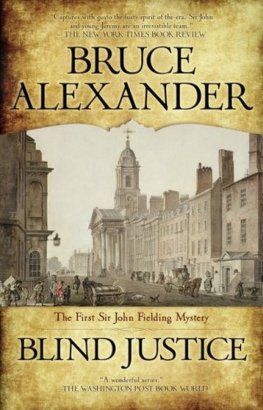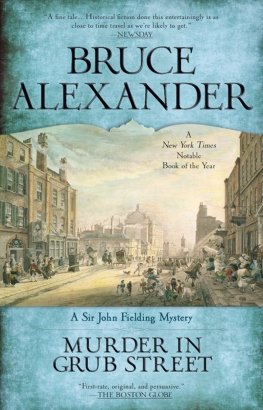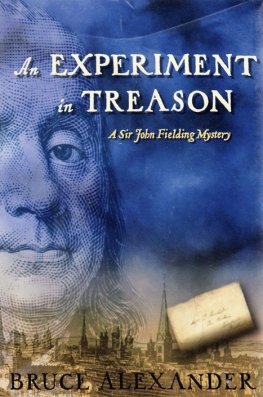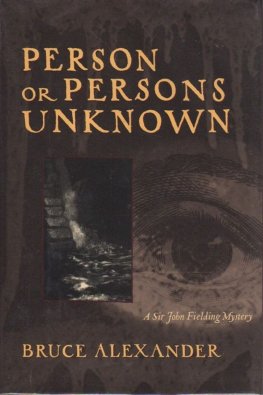Bruce Alexander - Jack, Knave and Fool
Here you can read online Bruce Alexander - Jack, Knave and Fool full text of the book (entire story) in english for free. Download pdf and epub, get meaning, cover and reviews about this ebook. year: 1999, genre: Adventure. Description of the work, (preface) as well as reviews are available. Best literature library LitArk.com created for fans of good reading and offers a wide selection of genres:
Romance novel
Science fiction
Adventure
Detective
Science
History
Home and family
Prose
Art
Politics
Computer
Non-fiction
Religion
Business
Children
Humor
Choose a favorite category and find really read worthwhile books. Enjoy immersion in the world of imagination, feel the emotions of the characters or learn something new for yourself, make an fascinating discovery.
- Book:Jack, Knave and Fool
- Author:
- Genre:
- Year:1999
- ISBN:9780786217984
- Rating:3 / 5
- Favourites:Add to favourites
- Your mark:
- 60
- 1
- 2
- 3
- 4
- 5
Jack, Knave and Fool: summary, description and annotation
We offer to read an annotation, description, summary or preface (depends on what the author of the book "Jack, Knave and Fool" wrote himself). If you haven't found the necessary information about the book — write in the comments, we will try to find it.
Jack, Knave and Fool — read online for free the complete book (whole text) full work
Below is the text of the book, divided by pages. System saving the place of the last page read, allows you to conveniently read the book "Jack, Knave and Fool" online for free, without having to search again every time where you left off. Put a bookmark, and you can go to the page where you finished reading at any time.
Font size:
Interval:
Bookmark:
Bruce Alexander
Jack, Knave and Fool
ONE
Because I have taken it upon myself to write of Sir John Fieldings feats of detection and of the most notorious matters which came before him as Magistrate of the Bow Street Court, I fear that the picture I have presented of him and his little household is somewhat unbalanced at best and most crudely distorted at worst. Each time I have taken up my pen, I have drawn a portrait of the man in crisis, so to speak, obsessed as he could indeed become with the solving of some puzzle and the apprehension of some malefactor. It was not always so. Indeed, through the years that I spent in the warmth of his association, Sir John was quite generally of an even and pleasant temper, a just and gentle ruler of his household.
Of the time I write, early in the year 1771, that household did consist of four: he, the master; his mistress, Lady Fielding; the widow Katherine Durham, whom he had taken as his second wife; Annie Oakum, our most capable cook, who had then just turned sixteen years of age; and I, Jeremy Proctor, a few months younger, Sir Johns man Friday, or so he called me, a fellow of all work porter and house cleaner for Lady Fielding, and for Sir John scribe, reader, runner of every sort of errand, and whenever needed, a ready pair of eyes. (It must be remembered, reader, that all of his remarkable accomplishments were made more remarkable still by the fact that he was blind.) We two younger members of the household were treated as near like the children of Sir John and Lady Fielding as ever any could be. True, we had our duties, but so also do the children of any proper family. Yet we sat at table with the elders not only in our quotidian routine, in the kitchen, but also when guests did attend in our modest dining room. On such grander occasions we were permitted to join in table talk, respectfully, as children should, when we were addressed directly. There were never two who counted themselves to be as lucky as Annie and me.
We went oft to the theater, all in a great party of four, and always to the Drury Lane, where David Garrick did hold forth. He and Sir John were well acquainted and greeted each other as friends. Yet it was not merely Mr. Gar-ricks generosity with tickets that took us so frequently to his performances. No, more, it was that he brought Shakespeare so often to the boards. None excelled him in his love for the Great Bard save perhaps for Sir John Fielding. It was to Mr. Garricks productions of Shakespeare that Sir John would take us, and to none other. No matter what hints Annie would drop in his path, he could not be moved to test what he called the new plays. And when Lady Fielding rather pointedly read an enthusiastic notice given the Drury Lanes production of Vanbrughs The Provokd Wife (not, certainly, a new play, but rather revived after a space of some fifty years), she found that it availed her nothing. Sir John refused to take the bait.
Ah, Kate, he had replied to her, it may be a very good play indeed, but surely not of the but quality. Why not wait a bit for the best? Then, after a moment, as if the thought had just struck him, said he: You know, Kate, I do believe that David is doing Hamlet again next week. Now, how would that suit you, eh?
So it was that we had the best or nothing at all. And we were, to my mind, all the richer for it. I do well recall Annie Oakums introduction to the theater. It came not long after she had entered Sir Johns employ and shortly after the departure of Tom Durham, Lady Fieldings son, on his first voyage as midshipman. Annie was so plainly heartbroken at Toms farewell that Sir John thought to cheer her-indeed, to raise all our spirits-with a dose of Shakespeare, the best medicine he knew for spiritual elevation.
Not Hamlet but Othello was the fare on the Drury Lanes menu that night. Mr. Garrick s preference for the tragedies over the comedies was well known, or at least widely suspected. It came naturally to him, I believe, for he was a man of serious mien; there was nothing about him of the fool. Yet there can be no doubt that the best roles in Shakespeare are to be found in the tragedies, and as manager of the company, he did not hesitate to choose those plays for presentation which showed him off as actor to the best advantage. He was certainly in grand form as the Moor for Annies introduction to the theater. As any who saw him will admit, he was not so much a great physical actor. Which is to say, he did not leap around the stage and throw his arms about as he spoke those great lines; such behavior, he would no doubt have said, befitted the dignity of neither the character nor the playwright. But never was there one who, with a matchless voice, could find such music in the words of Shakespeare. It was that quality which so pleased Sir John. And it was that quality, too, which on the night in question struck dear Annie utterly dumb.
In his generosity, and because it was a slow night at the end of the run, Mr. Garrick provided us with a box quite near the stage. It seemed indeed as if we were upon it, and the actors played their parts left and right around us. I was next to Annie, and we two sat in front, hanging over the rail a bit, with Sir John and Lady Fielding behind us. Therefore was I able to observe closely the effect of this new experience upon her who had become like a sister to me. It was indeed quite remarkable. At first I thought that it was the physical beauty of the scene revealed to us when the curtains parted which so impressed her the richly painted flats, the costumes of the actors. But no, it was more. A bit later, after a few glances her way, I noted that she was silently mouthing phrases and shorter lines spoken by the actors; not with them, of course, for she heard them for the first time, but just after, testing them upon her own lips. She paid no heed to me, and during breaks between the acts when I sought to engage her in conversation regarding the play and the performances of the actors, I found her quite unable to speak, so rapt was she in all that she had seen and heard. Lady Fielding, who had also been watching Annie closely, caught my eye and, smiling, shook her head; then did she whisper quietly in Sir Johns ear.
Though I would not have thought it possible, Annie became even more deeply absorbed as the play progressed. At certain points her mouth gaped at Iagos evil lies. And when, believing him, Mr. Garrick, in the blackface guise of Othello, rumbled forth that awful malediction, Damn her, lewd minx! O, damn her! she caught her breath in horror. At the murder of Desdemona she cupped hand to mouth and let out a little shriek; but such was the power of David Garricks performance that hers was not the only voice raised in shock. With the final curtain, our brave spectator showed herself completely overcome; tears streamed down her cheeks and flowed so freely from her eyes that she was near blinded by them; she failed to see the handkerchief offered her by Lady Fielding until it was pressed into her hand.
Though I myself was uncertain of what would be the result, Sir John insisted on taking us all backstage that we might congratulate Mr. Garrick on the production and his performance and thank him for his generosity in providing us a box to ourselves. I led our party down into the bowels of the great building, knowing the way well from previous visits. Sir John kept his hand firmly on my shoulder as we descended the stairs, and the women trailed after, Annie seeming somewhat reluctant, perhaps wishing not to end the state of rapture in which she had dwelt these last hours.
As we approached his dressing room, a couple emerged, man and woman, dressed quite grandly and speaking together in a tongue I took to be Dutch or German. The gentleman and I exchanged bows, his lady smiled, and the two moved rather swiftly past us.
Font size:
Interval:
Bookmark:
Similar books «Jack, Knave and Fool»
Look at similar books to Jack, Knave and Fool. We have selected literature similar in name and meaning in the hope of providing readers with more options to find new, interesting, not yet read works.
Discussion, reviews of the book Jack, Knave and Fool and just readers' own opinions. Leave your comments, write what you think about the work, its meaning or the main characters. Specify what exactly you liked and what you didn't like, and why you think so.


